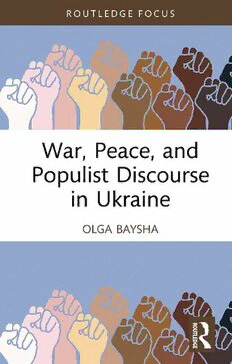
War Peace and Populist Discourse in Ukraine PDF
131 Pages·2023·1.358 MB·English
Most books are stored in the elastic cloud where traffic is expensive. For this reason, we have a limit on daily download.
Preview War Peace and Populist Discourse in Ukraine
Description:
This book explores the detrimental effects on global peace of populism’s tendency to present complex social issues in simplistic "good versus evil" terms. Analyzing the civilizational discourse of Ukrainian President Volodymyr Zelensky with respect to the ongoing war between Russia and Ukraine—with his division of the world into "civilized us" versus "barbarian them"—the book argues that such a one-dimensional representation of complex social reality leaves no space for understanding the conflict and has little, if any, potential to bring about peace.To deconstruct the "civilization versus barbarism" discourse propagated by Zelensky, the book incorporates into its analysis alternative articulations of the crisis by oppositional voices. The author looks at the writing of several popular Ukrainian journalists and bloggers who have been excluded from the field of political representation within Ukraine, where all oppositional media are currently banned. Drawing on the discourse theory of Ernesto Laclau and Chantal Mouffe, the author argues that the incorporation of alternative perspectives, and silenced voices, is vitally important for understanding the complexity of all international conflicts, including the current one between Russia and Ukraine.This timely and important study will be relevant for all students and scholars of media and communication studies, populist rhetoric, political communication, journalism, area studies, international relations, linguistics, discourse analysis, propaganda, and peace studies.
See more
The list of books you might like
Most books are stored in the elastic cloud where traffic is expensive. For this reason, we have a limit on daily download.
